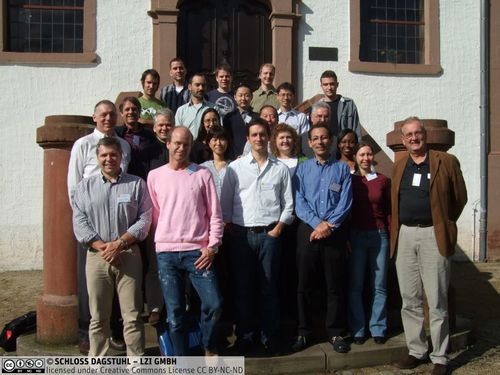Dagstuhl-Seminar 10401
Learning, Planning and Sharing Robot Knowledge for Human-Robot Interaction
( 03. Oct – 08. Oct, 2010 )
Permalink
Organisatoren
- Rachid Alami (LAAS - Toulouse, FR)
- Rüdiger Dillmann (KIT - Karlsruher Institut für Technologie, DE)
- Thomas C. Henderson (NSF - Arlington, US)
- Alexandra Kirsch (TU München, DE)
Kontakt
- Andreas Dolzmann (für wissenschaftliche Fragen)
- Annette Beyer (für administrative Fragen)
Programm
Autonomous robots acting in unstructured environments need sophisticated cognitive capabilities including perception, manipulation and navigation, planning and reasoning as well as knowledge acquisition and processing skills. Only when all these capabilities are combined can the robot show intelligent behavior and act appropriately in environments that are primarily designed for humans. Given the growing availability and inter-connectivity of modern agents and robots, better mechanisms to define, learn and share knowledge must be developed. Advances in robot platforms have led to their integration into society for a variety of functions, and there is a pressing need to understand how they can acquire and exploit knowledge required for their specific activities. In order to be useful, robotic agents must be able to recognize a wide range of objects, relations, and situations in their environment, and to understand the semantics of these. In addition, it is imperative that procedural and process knowledge also be known so that interactions are safe and meaningful. Cooperation and collaboration are also essential as well as the ability to perceive human and animal emotions and intentions to the largest degree possible.
This seminar brought together 25 scientists with experience in planning, learning, knowledge processing and human-robot interaction to discuss how the high-level control concepts are to be used and adapted to human-robot interaction. Because high-level control of robots interacting with humans is of special practical importance, we invite experts with experience in assistive technology and those examining social acceptance of such systems.
The seminar consisted of 8 sessions, which were focussed on discussions of the topics knowledge sharing, learning and interaction. In addition, there were 3 short presentations on topics that arose in the discussions and 7 full presentations.
- Rachid Alami (LAAS - Toulouse, FR) [dblp]
- Aniesha Alford (North Carolina A&T State University, US)
- Marcus Baum (KIT - Karlsruher Institut für Technologie, DE) [dblp]
- Darwin G. Caldwell (Italian Institute of Technology - Genova, IT)
- Rüdiger Dillmann (KIT - Karlsruher Institut für Technologie, DE)
- Aaron Edsinger (Meka Robotics - San Francisco, US)
- Xiuyi Fan (Imperial College London, GB)
- Christian Goerick (Honda Research Europe - Offenbach, DE)
- Edward Grant (North Carolina State University, US)
- Mathieu Guillame-Bert (INRIA - Grenoble, FR)
- Thomas C. Henderson (NSF - Arlington, US)
- Charles C. Kemp (Georgia Institute of Technology - Atlanta, US) [dblp]
- Alexandra Kirsch (TU München, DE) [dblp]
- Ben Kröse (VU University Amsterdam, NL)
- Thibault Kruse (TU München, DE)
- Dongheui Lee (TU München, DE)
- Gordon K. Lee (San Diego State University, US)
- Severin Lemaignan (LAAS - Toulouse, FR) [dblp]
- Ingo Lütkebohle (Universität Bielefeld, DE)
- Lynne E. Parker (University of Tennessee, Knoxville, US) [dblp]
- Raquel Ros Espinoza (Imperial College London, GB)
- Lars Schillingmann (Universität Bielefeld, DE)
- Marc Toussaint (TU Berlin, DE) [dblp]
- Patrick van der Smagt (DLR - Oberpfaffenhofen, DE)
- Katsu Yamane (Disney Research - Pittsburgh, US) [dblp]
Klassifikation
- artificial intelligence
- robotics
- cognition
- human-machine interaction
Schlagworte
- human-robot interaction
- robot knowledge representation and sharing
- learning
- planning


